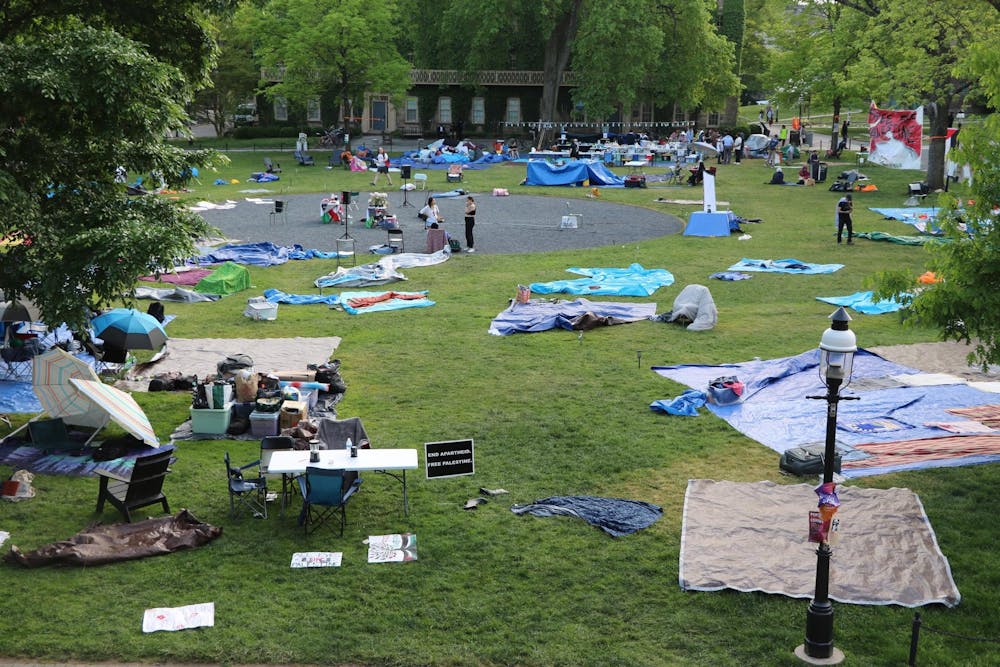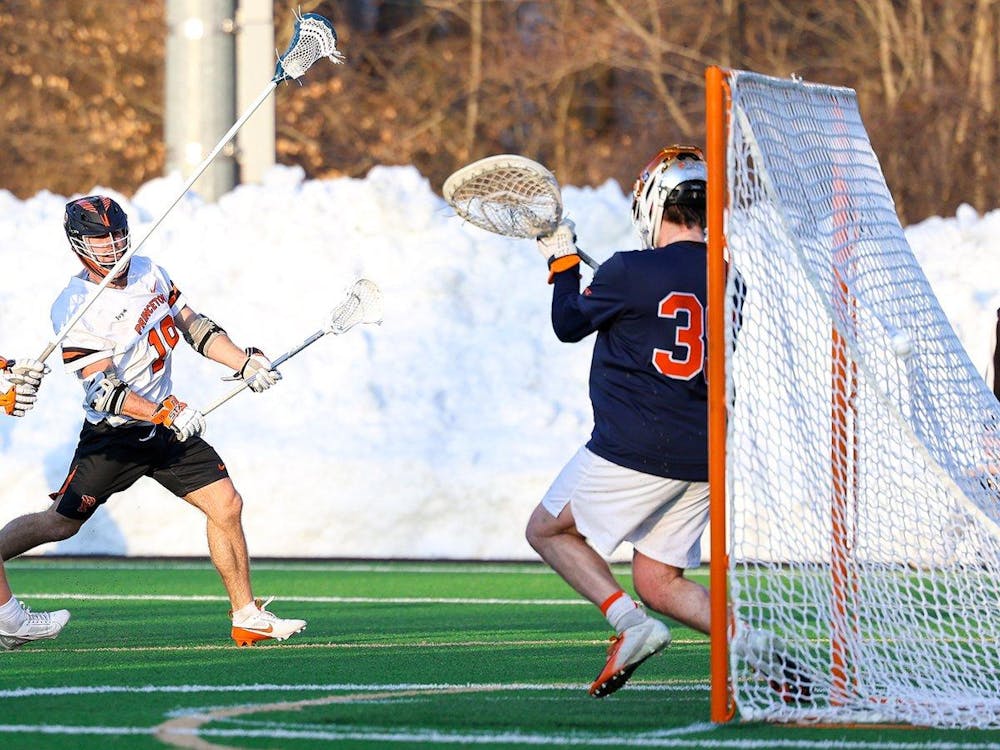In an email to undergraduates sent at 6:04 p.m. on Monday, May 13, President Christopher Eisgruber ’83 announced that protesters at the “Gaza Solidarity Encampment” must clear Cannon Green. He also outlined the next steps towards responding to the protesters demands, including a Council of the Princeton University Community (CPUC) Resources Committee meeting to discuss divestment from Israel on Tuesday, May 14.
The announcement comes shortly after protesters expressed dissatisfaction with their negotiations with University officials publicly in a statement Saturday. A final negotiation session was held on Friday, May 10. On Saturday, May 11, protesters voted to remain on Cannon Green for the time being, potentially until reunions start on May 23. The “Gaza Solidarity Encampment” has almost reached three full weeks, having begun at McCosh Courtyard on April 25 before moving to Cannon Green on April 29 following the occupation of Clio Hall.
Eisgruber’s letter did not address the sit-in in detail until the third-to-last paragraph, stating, “we are now letting the protestors know that they need to clear Cannon Green and respect the University’s need for it and other common spaces, so that the University may prepare for and produce end-of-year events.”
“The sit-in makes it impossible to ready the green for Class Day and other events,” he added. Class Day is set to be held on Cannon Green on Monday, May 27.
The message did not state a deadline for the encampment to disperse or be cleared. University Spokesperson Jennifer Morrill declined to comment on the existence of such a deadline.
“Under these circumstances, to continue the sit-in would involve a significant and impermissible disruption of University activities,” Eisgruber continued. “The protestors are of course free to express their views in many other permissible, non-disruptive ways.”
Much of the letter addressed action items following negotiations between a delegation of protesters and University administrators. According to a town hall held on Wednesday, May 8, the sit-in’s eight-person bargaining group is comprised of two undergraduates, two graduate students, two postdocs, and two faculty members. Beginning on May 6, the two parties met four times, with a final meeting on May 10.
In a May 10 press release, the organizers noted that, “Instead of making tangible commitments, administrators backpedaled on opening negotiations and merely directed representatives to existing institutional processes.”

Eisgruber’s letter rebuffed the complaint in his message, stating that administrators “explained that issues of general interest to the University community must be addressed, whenever possible, through appropriate processes that respect the interests of multiple parties and viewpoints, not through negotiations with a single interest group.”
The encampment’s first demand has been dissociation and divestment from “companies that profit from or engage in Israel’s ongoing military campaign, occupation, and apartheid policies.”
Because protesters have brought this request to the administration, Eisgruber said, the Council of the Princeton University Community (CPUC) Resources Committee will meet on Tuesday, May 14 “for an initial assessment of those requests.” He added that it is standard practice for this committee to meet “shortly after receiving divestment requests or petitions.”
The letter also addressed additional encampment demands, including the charges and disciplinary action faced by the arrestees.

“The University is exploring offering students arrested for protest-related offenses the option to participate in a ‘restorative justice’ process,” according to the message. While few details were provided about the process itself, Eisgruber noted that this “would rapidly conclude the University disciplinary process, making it possible for the students to join Commencement and receive their degrees along with their classmates.”
Eisgruber also wrote that the University will continue to consider proposals for “academic affiliations with Palestinian scholars, students, and institutions” and “new curricula in Palestinian studies,” in accordance with existing processes. Vice Provost for Institutional Equity and Diversity Michele Minter “has offered to convene a working group on the experience of Palestinian students, staff, and faculty at Princeton,” which aligns with past University responses to “concerns about campus climate.”
Furthermore, Eisgruber pointed students to “staff members in Campus Life” if the existing affinity space for Middle Eastern, North African, and Arab students on campus “is not adequately serving its purpose or the community it is intended to support.”
Other demands, including “requests for severing ties from the United States military, academic boycotts of Israel, ceasefire statements, or complete amnesty for arrested protestors,” could not be fulfilled “without breaching principles fundamental to the University’s governance and mission,” Eisgruber wrote, rendering these proposals unworkable.
In a statement to the Daily Princetonian shortly after the statement was released, organizers wrote, “Our demands remain the same. No other comment at this time.”
Olivia Sanchez is an associate News editor for the ‘Prince.’ She is from New Jersey and often covers the graduate school and academic departments.
Annie Rupertus is a head News editor for the ‘Prince’ from Philadelphia, Pa. who often covers activism and campus governance.
Please send any corrections to corrections[at]dailyprincetonian.com.








